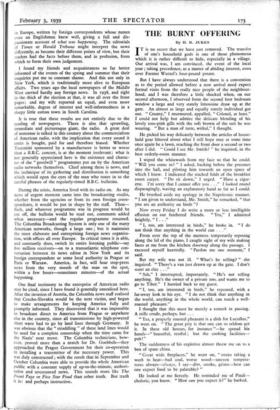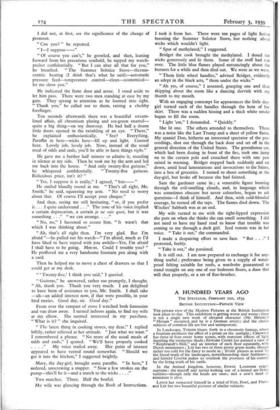THE BURNT OFFERING
By H. R. JUKES
IT is no secret that we have just removed. The transfer of one's household gods is one of those phenomena which it is rather difficult to hide, especially in a village. Our arrival was, I am convinced, the event of the local year ; taking precedence, as a matter of abiding interest, even over Farmer Wurzel's four-pound potato.
But I have always understood that there is a convention as to the period allowed before a new arrival need expect formal visits from the really nice people of the neighbour- hood, and I was therefore a little shocked when, on our second afternoon, I observed from the second best bedroom window a large and very stately limousine draw up at the gate. An almost as large and equally stately individual got out. " County," I murmured, appalled, " Colonel, at least." I could not help but admire the delicate blending of his lovely rose-pink gills with the soft brown of the suit he was wearing. " But a man of taste, withal," I thought.
He picked his way delicately between the articles of house- hold gear littered about what I still hope may at some time once again be a lawn, reaching the front door a second or two after I did. " Could I see Mr. Smith? " he inquired, in the best orderly-room manner.
I wiped the whitewash from my face so that he could. " Will you come in? " I asked, backing before the presence into the hall, and piloting him towards an open space of which I knew. I indicated the stacked folds of the breakfast room carpet. " Do sit down," I urged. " Have a cigar- ette. I'm sorry that I cannot offer you . . ." I looked round disparagingly, waving an explanatory hand as far as I could.
He brushed aside my apology in the Napoleonic manner. " I am given to understand, Mr. Smith," he remarked, " that you are an authority on birds "?
Now every Friday I do write a more or less intelligible effusion on our feathered friends. " Yes," I admitted brightly, " I . . ."
" I, too, am interested in birds," he broke in. " I do not think that anything in the world can . . ."
From over the top of the mattress temporarily reposing along the lid of the piano, I caught sight of my wife making faces at me from the kitchen doorway along the passage. I excused myself hurriedly. " Pardon me one moment," I said.
But my wife was not ill. " What's he selling? " she inquired. " There's a van just drawn up at the gate. I don't want an elec . . ."
" Ssh," I interrupted, importantly. " He's not selling anything. He's the owner of a private zoo, and wants me to go to Tibet." I hurried back to my guest.
" I, too, am interested in birds," he repeated, with a far-away look in his eye. " I do not think that anything in the world, anything in the whole world, can touch a well- roasted pheasant."
I thought that this must be merely a remark in passing. A trifle crude, perhaps, but . . .
" Yes, a properly roasted pheasant is a dish for Lucullus," he went on. " The great pity is that one can so seldom get it. In these old houses, for instance "—he spread his hands—" beautiful, restful ; but the cooking facilities- pahl" The suddenness of his expletive almost threw me on to a box of spare china.
" Great wide fireplaces," he went on, " ovens taking a week to heat—bad coal, worse wood—uneven tempera- tures always—a/ways, I say—dirt, smoke, grime—how can one expect food to be palatable? "
He looked at me fiercely. He reminded me of Pindi- choleric, you know. " How can you expect it?" he barked. I did not, at first, see the significance of the change of pronoun.
" Can you? " he repeated.
" suppose—" " Of course you can't," he growled, and then, leaning forward from his precarious seathold, he tapped my watch- pocket confidentially. " But I can alter all that for you," he breathed. " The Summer Solstice Stove—thermo- centric heating (I think that's what he said)—automatic pressure feed—temperature control—clean—economical- let me show you."
He indicated the front door and arose. I stood aside to let him pass. There were two men standing at ease by my gate. They sprang to attention as he loomed into sight. " Thank you," he called out to them, raising a chubby forefinger.
Ten seconds afterwards there was a beautiful stream- lined affair, all chromium plating and sea-green enamel— quite a big thing—on my doorstep. He had half a dozen little doors opened in the twinkling of an eye. "There," he explained enthusiastically. " See? Everything. Paraffin in here—wicks here—fill up and light. Control here. Lovely job, lovely job. Now, instead of the usual meal of odds and ends, you'll be able to have things right."
He gave me a further half minute to admire it, standing in silence at my side. Then he took me by the arm and led me back into the house. " And only twenty-five guineas," he whispered confidentially. " Twenty-five guineas. Ridiculous price, isn't it? "
" Yes, I suppose it is really," I agreed, " but " He smiled blandly round at me. " That's all right, Mr. Smith," he said, squeezing my arm. " No need to worry about that. Of course I'll accept your cheque."
And then, seeing me still hesitating, " or, if you prefer it .. . I quite understand . . ." The tone of his voice implied a certain deprecation, a certain je ne sais quoi, but it was something . . ." " we can arrange. . . ."
" No, no," I hastened to assure him. " It wasn't that which I was thinking about."
" Ah, that's all right then. I'm very glad. But I'm afraid "—he pulled out his watch—" I'm afraid, much as I'd have liked to have stayed with you awhile—Yes, I'm afraid I shall have to be going. Mm-m. Could I trouble you? " He proffered me a very handsome fountain pen along with a card.
Then he helped me to move a chest of drawers so that I could get at my desk.
" Twenty-five,' I think you said," I queried.
" Guineas," he answered, rather too promptly, I thought. " Ah, thank you. Thank you very much. I am delighted to have been of assistance to you, Mr. Smith. I shall take —ah—an added interest now, if that were possible, in your bird stories. Good day, sir. Good day."
From over the rampart of stove I watched both limousine and van draw away. I turned indoors again, to find my wife at my elbow. She seemed interested in my purchase. " What is it? " she inquired.
" The latest thing in cooking stoves, my dear," I replied loftily, rather relieved at her attitude. " Just what we want." I remembered a phrase. " No more of the usual meals of odds and ends," I quoted. " We'll have properly cooked . . . ." My voice trailed away. Her point of interest appeared to have veered round somewhat. " Should we get it into the kitchen," I suggested brightly.
Mary, the day-girl, brought some paraffin. " In here," I ordered, unscrewing a stopper. " Now a few strokes on the pump—this'll be it—and a match to the wicks . . . ."
Two matches. Three. Half the boxful.
My wife was glancing through the Book of Instructions. I took it from her. There were ten pages of light fiction boosting the Summer Solstice Stove, but nothing about wicks which wouldn't light.
" Spot of methylated," I suggested.
Bridget the cook brought the methylated. I dosed the wicks generously and lit them. Some of the stuff had run over. The little blue flames played entrancingly about the burners for a while and then died out. We were as we were.
" Them little wheel handles," advised Bridget, evidently an adept in the black arts, " them under the wicks."
" Ah yes, of course," I assented, grasping one and then skipping about the room like a dancing dervish with my thumb to my mouth.
With an engaging contempt for appearances the little day- girl turned each of the handles through the hem of her skirt. There was a sudden hissing and a thick white smoke began to fill the room.
" Light 'em," I demanded. " Quickly."
She lit one. The others attended to themselves. There was a noise like the Last Trump and a sheet of yellow flame. My spaniel Don, hitherto an interested spectator of the pro- ceedings, shot out through the back door and set off in the general direction of the United States. The greenhouse cat, which had been dozing in front of the fire, took one jump on to the curtain pole and crouched there with one paw raised in warning. Bridget stepped back suddenly and sat down, amid loud lamentations and invocations to the Saints, into a box of groceries. I turned to shout something at the day-girl, but broke off because she had fainted.
Sam the gardener came in ; a venerable figure looming through the evil-smelling clouds, and, in language which was sometimes obscure but never colourless, began to ask questions—I think of himself. And then, with cold-blooded courage, he turned off the taps. The flames died down. The Witches' Sabbath was at an end.
My wife turned to me with the tight-lipped expression she puts on when she thinks she can smell something. I did not need to have my hand read to know that trouble was coming to me through a dark girl. Iced venom was in her voice. " Take it out," she commanded.
I made a despairing effort to save face. " But . . ." I protested, feebly.
" Take it out," she persisted.
It is still out. I am now prepared to exchange it for any- thing useful ; preference being given to a supply of water- proof felting suitable for roofs, a wardrobe guaranteed to stand straight on any one of our bedroom floors, a door that will shut properly, or a set of flue-brushes.











































 Previous page
Previous page